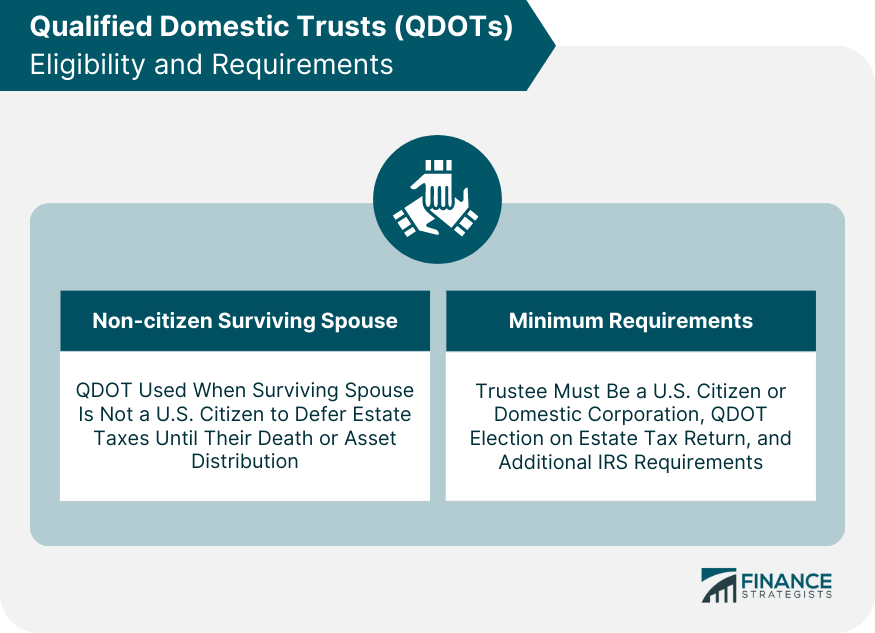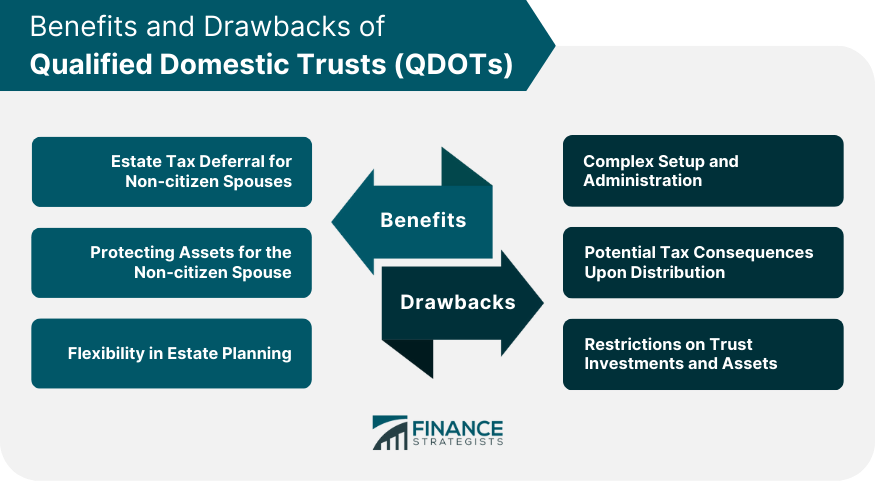Qualified Domestic Trusts (QDOTs) are a specialized type of trust used in estate planning when one spouse is a non-U.S. citizen. The purpose of a QDOT is to ensure that the non-citizen surviving spouse receives financial support while also complying with U.S. estate tax laws. Unlike U.S. citizen spouses who can take advantage of the unlimited marital deduction, non-citizen spouses do not have the same tax benefits. By establishing a QDOT, the estate taxes on assets passing to the non-citizen spouse can be deferred until their death or distribution from the trust. QDOTs have specific eligibility criteria and requirements, including the appointment of a qualified trustee and making a QDOT election on the estate tax return. Understanding the intricacies of QDOTs is essential for couples with a non-U.S. citizen spouse to navigate estate planning effectively and minimize tax implications. A QDOT is used when the surviving spouse is not a U.S. citizen, as the unlimited marital deduction available to U.S. citizens is not applicable to non-citizen spouses. By setting up a QDOT, the estate of the deceased spouse can defer estate taxes until the non-citizen spouse's death or until assets are distributed from the trust. In order to qualify as a QDOT, a trust must meet certain requirements specified by the Internal Revenue Service (IRS): At least one trustee must be a U.S. citizen or a domestic corporation. This trustee is responsible for ensuring that any estate taxes due are paid upon the non-citizen spouse's death or upon distribution of trust assets. The executor of the deceased spouse's estate must make an election on the estate tax return to treat the trust as a QDOT. This election must be made by the due date of the estate tax return, including any extensions. Additional requirements may be imposed by the IRS, such as specific language in the trust document or the use of specific trust assets. Consult with an estate planning attorney to ensure compliance with all QDOT requirements. QDOTs provide the benefit of estate tax deferral, allowing the non-citizen spouse to access trust assets without incurring an immediate estate tax liability. Additionally, certain exemptions may be available to reduce the overall estate tax burden, such as the applicable exclusion amount or the marital deduction for non-citizen spouses in specific situations. Income generated by a QDOT is generally subject to income tax. The trust itself may be responsible for paying income taxes on undistributed income, while beneficiaries may be responsible for paying income taxes on distributed income. It is important to consult with a tax professional to understand the specific income tax implications of a QDOT. QDOTs are subject to specific tax reporting requirements, including the filing of annual income tax returns and, in some cases, additional informational returns. Failure to comply with these reporting requirements can result in penalties and interest, making it crucial to work with a tax professional to ensure compliance. One of the primary benefits of a QDOT is the deferral of estate taxes that would otherwise be due upon the death of the first spouse. This deferral allows the non-citizen surviving spouse to have access to the assets within the trust without immediately incurring a significant tax liability. A QDOT ensures that assets are protected for the non-citizen spouse, providing financial security and stability. The trust can be structured to provide income or principal distributions to the non-citizen spouse according to the needs and wishes of the couple. QDOTs can be combined with other estate planning tools to create a comprehensive plan that addresses the unique needs of each family. This flexibility allows couples to tailor their estate plan to their specific situation and goals. Setting up and administering a QDOT can be complex and may require the assistance of an experienced estate planning attorney. Ensuring compliance with IRS requirements and managing trust assets can be time-consuming and costly. While a QDOT allows for estate tax deferral, taxes will be due upon the non-citizen spouse's death or when assets are distributed from the trust. This can result in significant tax liability, depending on the value of the trust assets. QDOTs are subject to specific restrictions on trust investments and assets. These restrictions can limit the types of investments and assets that can be held within the trust and may impact the overall performance of the trust. QDOTs can be used in conjunction with other estate planning tools to create a comprehensive estate plan that addresses the needs of both U.S. citizens and non-citizen spouses. For example, a QDOT may be combined with a bypass trust to maximize estate tax savings and ensure that assets are protected for the non-citizen spouse. In high-net-worth estates, QDOTs can play a crucial role in minimizing estate taxes and preserving wealth for future generations. By deferring estate taxes and providing asset protection for the non-citizen spouse, QDOTs can help ensure that a family's wealth is preserved and passed down according to their wishes. Estate and tax laws are subject to change, and it is essential to stay informed and adapt to these changes when necessary. Working with an experienced estate planning attorney and tax professional can help ensure that your estate plan remains up-to-date and compliant with current laws and regulations. Regularly reviewing and updating your estate plan can help address any changes in your personal situation, as well as any changes in estate and tax laws. Qualified Domestic Trusts (QDOTs) offer significant benefits for couples with a non-citizen spouse in estate planning. By deferring estate taxes and protecting assets for the non-citizen spouse, QDOTs provide financial security and flexibility. However, setting up and administering a QDOT can be complex, requiring professional assistance. Taxes may be due upon the non-citizen spouse's death or distribution of assets, and there are specific investment and asset restrictions. To use QDOTs effectively, they can be combined with other estate planning tools and tailored to high-net-worth estates. It's crucial to stay updated on estate and tax laws, working with professionals to ensure compliance and adapt to any changes. Regularly reviewing and updating the estate plan helps address personal and legal developments. However, it is essential to work with experienced professionals to ensure that a QDOT is set up and administered correctly, and to stay informed about potential changes in estate and tax laws.Definition of Qualified Domestic Trusts (QDOTs)
QDOT Eligibility and Requirements
Non-Citizen Surviving Spouse
Minimum Requirements for a Trust to Qualify as a QDOT
Trustee Requirements
QDOT Election
Other Requirements as Specified by the IRS

Tax Implications of QDOTs
Estate Tax Deferral and Potential Exemptions
Income Tax Considerations for the Trust and Beneficiaries
Tax Reporting Requirements for QDOTs
Benefits of QDOTs
Estate Tax Deferral for Non-Citizen Surviving Spouses
Protecting Assets for the Non-Citizen Spouse
Flexibility in Estate Planning
Drawbacks of QDOTs
Complex Setup and Administration
Potential Tax Consequences Upon Distribution
Restrictions on Trust Investments and Assets

Strategies for Using QDOTs Effectively
Combining QDOTs With Other Estate Planning Tools
Utilizing QDOTs in High-Net-Worth Estates
Addressing Potential Changes in Estate and Tax Laws

Conclusion
Qualified Domestic Trusts (QDOTs) FAQs
Qualified Domestic Trusts (QDOTs) are special trusts designed for couples with a non-citizen spouse. They provide estate tax deferral, asset protection, and flexibility in estate planning, ensuring financial security for the non-citizen spouse and allowing the couple to navigate unique tax challenges.
To set up a QDOT, the surviving spouse must be a non-citizen, and the trust must meet specific requirements specified by the IRS. These include having at least one trustee who is a U.S. citizen or domestic corporation, making a QDOT election on the estate tax return, and complying with any additional IRS requirements, such as specific language in the trust document or the use of certain trust assets.
QDOTs allow the deferral of estate taxes that would otherwise be due upon the death of the first spouse. This deferral enables the non-citizen surviving spouse to have access to the assets within the trust without incurring an immediate tax liability, providing financial security and stability.
Some limitations of QDOTs include complex setup and administration, potential tax consequences upon distribution, and restrictions on trust investments and assets. Couples should carefully consider these limitations and work with experienced professionals to ensure that a QDOT is set up and administered correctly.
Yes, QDOTs can be combined with other estate planning tools, such as bypass trusts, marital deduction trusts, or revocable living trusts, to create a comprehensive estate plan that addresses the unique needs of each family. This flexibility allows couples to tailor their estate plan to their specific situation and goals.
True Tamplin is a published author, public speaker, CEO of UpDigital, and founder of Finance Strategists.
True is a Certified Educator in Personal Finance (CEPF®), author of The Handy Financial Ratios Guide, a member of the Society for Advancing Business Editing and Writing, contributes to his financial education site, Finance Strategists, and has spoken to various financial communities such as the CFA Institute, as well as university students like his Alma mater, Biola University, where he received a bachelor of science in business and data analytics.
To learn more about True, visit his personal website or view his author profiles on Amazon, Nasdaq and Forbes.











